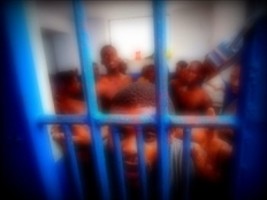|
||||||||||||||||||
| Download the revised decree and electoral calendar, published in the official journal |
|
|
Haiti - Justice : Detainees in Haiti at the gates of hell 05/04/2021 10:20:54
Human rights report on conditions (2020) in prisons and detention centers in Haiti... Prisons and detention centers throughout the country were life threatening due to being overcrowded, poorly maintained, and unsanitary, and providing insufficient nutrition. BINUH reported that prisons and detention centers had an occupancy rate of 345 percent. https://www.haitilibre.com/en/news-23478-haiti-flash-haiti-world-champion-of-prison-overcrowding.html Physical Conditions: Overcrowding at prisons and detention centers was severe, especially at the National Penitentiary in Port-au-Prince and the prison in Cap Haitien, where each prisoner had 8.6 square feet (74 cm2) of space https://www.haitilibre.com/en/news-8161-haiti-justice0-62-m2-per-prisoner-in-haiti.html . In many prisons detainees slept in shifts due to the lack of space. Some prisons had no beds for detainees, and some cells had no natural light. In other prisons the cells often were open to the elements or lacked adequate ventilation. Many prison facilities lacked adequate basic services such as plumbing, sanitation, waste disposal, electricity, ventilation, and lighting. Prison conditions generally varied by gender; female inmates had more space per person in their cells than their male counterparts. As of November approximately 365 prisoners were held in makeshift and unofficial detention centers such as police stations in Petit-Goave, Miragoane, Gonaives, and some parts of Port-au-Prince. Local authorities held suspects in these facilities, sometimes for extended periods, without registering them with the HNP’s Directorate of Prisons. Authorities in Port-au-Prince maintained separate penitentiaries for adult men, adult women, and minors. In Port-au-Prince all male prisoners younger than 18 were held at the juvenile facility at Delmas 33. Due to the lack of documentation, authorities could not always verify the ages of detainees. At times authorities mistakenly detained minors believed to be 18 or older, whose ages they could not confirm, with adult inmates. Authorities moved the vast majority of these minors to juvenile detention centers within two months of verifying their ages. Outside the capital, due to lack of prison space and oversight, authorities sometimes did not separate juveniles from adult prisoners or separate convicted prisoners from pretrial detainees, as the law requires. There are specific provisions for juvenile offenders. Children younger than age 13 are not held responsible for their actions. Until age 16, children may not be held in adult prisons or share cells with adults. Juvenile offenders (anyone younger than 18) are placed in re-education centers with the objective of having the offender successfully rejoin society. There were two rehabilitation centers, both in Port-au-Prince, which held offenders up to age 18. Because of poor security, severe understaffing, and a lack of adequate facilities in some detention centers, prison officials often did not allow prisoners out of their cells for exercise. In the National Penitentiary, prisoners spent approximately one hour per day outside of confinement, but in all other facilities, prisoners had 15-20 minutes to bathe before returning to their cells. International and local observers said prisoners and detainees suffered from malnutrition. Approximately 1,000 inmates within the penitentiary system were acutely malnourished. Prisoners’ access to adequate nutrition was problematic. The HNP was responsible for the delivery of food to prisons. Human rights observers reported that delays in fund disbursement and payments to contracted food suppliers reduced the number of meals fed to prisoners. Some prisons had kitchen facilities and employed persons to prepare and distribute food. Prison authorities generally gave prisoners one or two meals a day, consisting of broth with flour dumplings and potatoes, rice and beans, or porridge. None of the regular meals provided sufficient calories, according to medical standards. Authorities allowed regular deliveries of food to prisoners from relatives and friends. International and local observers also reported a lack of basic hygiene, poor health care, and waterborne illnesses within the prison system. The NGO Health through Walls reported that unsanitary conditions and overcrowding led to high rates of tuberculosis and other communicable diseases https://www.haitilibre.com/en/news-20013-haiti-flash-nightmare-at-the-national-penitentiary.html . Most detention facilities had only basic clinics and lacked medications. Many lacked medical isolation units for patients with contagious illnesses. Few prisons had the resources to treat serious medical situations. Some very ill prisoners were treated at hospitals outside of prisons, but many hospitals were reluctant to accept prisoners as patients since there was no formal arrangement between the Ministry of Justice and the Ministry of Public Health regarding payment for treatment. Administration: The country’s independent human rights monitoring body, the Office of Citizen Protection (OPC), investigated credible allegations of inhuman conditions in prisons. The OPC regularly visited prisons and detention facilities throughout the country and worked closely with NGOs and civil society groups. Independent Monitoring: Authorities permitted representatives from the United Nations, local human rights NGOs, and other organizations to monitor prison conditions. These institutions and organizations investigated allegations of abuse and mistreatment of prisoners. Improvements: To decrease the number of inmates in prisons, 415 detainees received a presidential pardon in June and were released https://www.haitilibre.com/en/news-31101-haiti-politic-415-prisoners-pardoned-by-president-moise.html . Following special court hearings, the government released an additional 627 detainees to reduce the prison population and avoid mass infection. Pretrial Detention: Prolonged pretrial detention remained a serious problem due to the arbitrary application of court rules, court discretion, corruption, and poor record keeping. The judicial system rarely observed the constitutional mandate to bring detainees before a judge within 48 hours. Many pretrial detainees never consulted with an attorney, appeared before a judge, https://www.haitilibre.com/en/news-8898-haiti-justice-95-of-inmates-atnational-penitentiary-are-incarcerated-without-trial.html https://www.haitilibre.com/en/news-23647-haiti-justice-more-than-75-of-prisoners-in-haitian-prisons-have-never-been-tried.html or received a docket timeline. In some cases detainees spent years in detention without appearing before a judge. According to the RNDDH, pretrial detainees constituted 78 percent of the prison population in October, up from 72 percent at the same time in 2019. Prison population statistics did not include the large number of persons held in police stations around the country for longer than the 48-hour maximum initial detention period. Statistics were not available on the average length of stay in pretrial detention. See also : https://www.haitilibre.com/en/news-20013-haiti-flash-nightmare-at-the-national-penitentiary.html https://www.haitilibre.com/en/news-8161-haiti-justice0-62-m2-per-prisoner-in-haiti.html HL/ HaitiLibre
|
|
|
Why HaitiLibre ? |
Contact us |
Français
Copyright © 2010 - 2026 Haitilibre.com |





